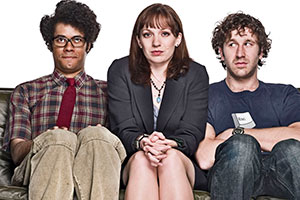Graham Linehan (2006) interview
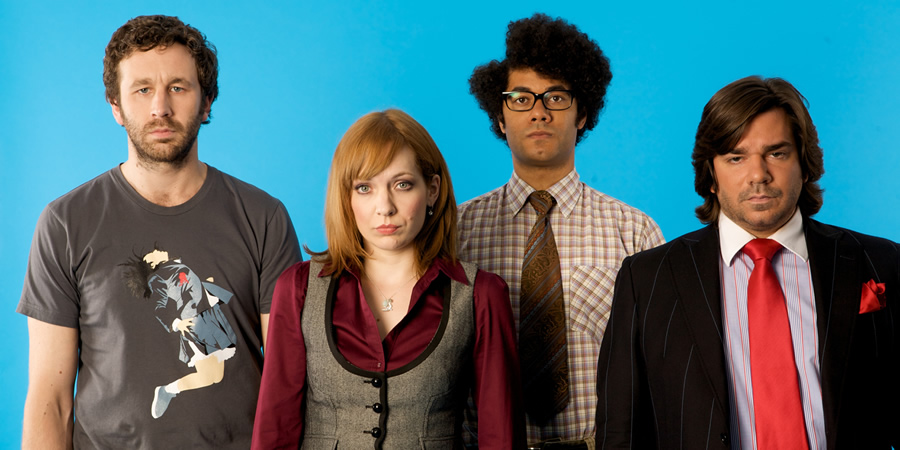
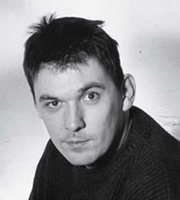
An interview with Graham Linehan conducted in 2006...
Comedy is a risky, capricious business. One minute, you seem to have a direct line straight to the national funny bone, the next, you've slipped on the banana skin of fate and landed on the whoopee cushion of comedy exile. One day, you've got Christmas Specials and sell-out tours, the next you barely warrant a slot on an undiscovered satellite channel between repeats of Oh, Dr Beeching! and 'Allo 'Allo.
Which makes writer Graham Linehan's run of successes all the more remarkable. Best known for the wildly popular series Father Ted, Black Books and Big Train, he's actually had a finger in more pies than Delia Smith. He's written for Brass Eye, The Harry Enfield Show, Friday Night Armistice, The Day Today, Smith and Jones, Coogan's Run and The Fast Show. He directed the pilot episode of Little Britain, is an award-winning advertisement-maker, successful journalist, occasional actor and a stand-up. Despite all this success, as he explains, he never set out to be a comedian...
I used to be a music journalist, and when I was writing prose I found that my default position was a comic position. I realised that while I fancied myself as a proper prose writer, it was closer to the truth to say I was more of a humorous writer. My most successful stuff was always the funnier stuff. Whenever I try to be serious or poetic it's always embarrassing and pompous.
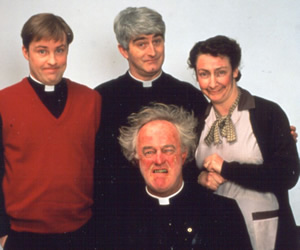
The decision to concentrate on comedy duly followed, and at the young age of 25, Linehan wrote the first series of Father Ted with his collaborator Arthur Mathews. It was the beginning of a long and fruitful partnership.
I don't think I'll ever have as pleasurable a writing experience as I did writing with Arthur. That was as good as it gets. Insane as it sounds, we would literally come to work and laugh for an entire day. Actually, that is a misuse of the word literally. We didn't actually just come in and laugh. We would tell jokes to each other, rather than just sit there and laugh at nothing for an entire day. I love people who misuse literally... "My head literally fell off". I tried to put a few of them into The IT Crowd. Jen, at one point, says
I'd literally rather sleep with a rat
. Anyway, with Arthur it was pretty close to perfect. We were just laughing all the time. My sense of humour was getting better and better because I was measuring it against Arthur's, which was so good. To make him laugh was a pretty big achievement in my book. We were constantly trying to make each other laugh and outdo each other.
The resulting show, a story of three dysfunctional priests living on a remote island, ran for three series, and won award after award, before the tragically young death of its star, Dermot Morgan. To this day, Father Ted remains a character close to Linehan's heart – indeed, his favourite comic creation. I always had a real soft spot for Father Ted himself. On that show, he was the one who had a lot of heart, and gave the show its emotion. Really, when you think about it, Ted's situation is very unlucky. I like almost all of my characters, but I've a real affection for Ted.
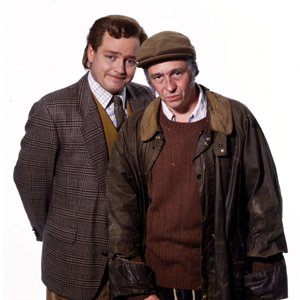
Whether through a fondness for the name Ted, or simply an inability to think of any other names, another of Linehan and Mathews' great comic creations was called Ted. Ted and Ralph, the faithful, forelock-tugging gardener and his painfully shy, adoring estate-owning boss, became an enduring feature of The Fast Show, though few realise that Mathews and Linehan created them.
Arthur and I were having a discussion about what makes a good sketch, and we were on a train and passed by a big country house, and we thought about the relationship between the master of the country house and the groundsman. It seemed like a good idea, because that was a relationship people could understand, and it hadn't really been done a lot. And I forget which one of us said it, but we decided the master of the house asks the grounds man if he liked Tina Turner, and something about that idea made us both laugh.
Linehan's next sitcom, Black Books, was written in conjunction with one of its stars, Dylan Moran. Like Father Ted, it won a clutch of awards, including the Best Sitcom BAFTA, and like Father Ted, it featured three dysfunctional people thrown together by mutual dependence. The IT Crowd is based upon a similar conceit. Although the setting, in the IT department of a successful London company, is very different, the dingy basement office is populated by two computer geeks and their only moderately less feckless female boss.
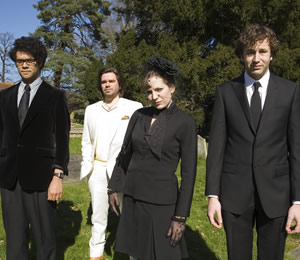
The three people together, especially the thing of two guys and a girl, is a pretty powerful set up. You could possibly transfer everyone from Seinfeld onto the show. I don't know if it's intentional, it's sometimes just the way things turn out. It's the right amount for a sitcom, though. It's a manageable amount of people.
The acknowledgement of Seinfeld as an influence is one that Linehan has made throughout his career, as he confirms. I'm very interested in the mechanics of script writing, and Seinfeld seems to be, on a structural level, the best-written sitcom ever. That's a big influence. And I've always been a huge Woody Allen fan. My writing was very influenced by him – especially his prose writing – the comic pieces that he did for the New Yorker. When I was a kid, I actually stole a lot of his material to use in debates that I was doing in class. So I guess Jewish New York comedians are pretty big on my list.
Linehan has also enjoyed occasional forays into acting, making cameo appearances in both his own shows and I'm Alan Partridge and Garth Marenghi's Darkplace. Has he ever been tempted to cast himself as a lead character in one of his creations? Oh I tried to do that with The IT Crowd, but was met with complete indifference. It was like someone farted when I suggested that. I originally thought I might play Roy, and thank God I was completely ignored, and we got in Chris O'Dowd instead. It's something I occasionally do for other people, and I do enjoy it when I do it. The problem is I couldn't make a career as an actor, because the quality of the scripts generally is so weak that I'd just spend my entire life depressed, which I'm sure a lot of actors do.
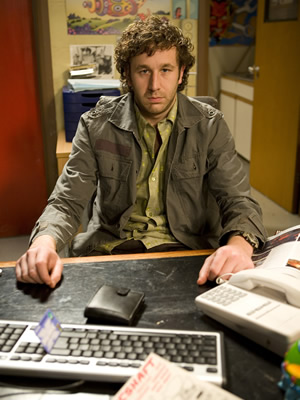
The casting of Chris O'Dowd as one of the three leads, though, was not without controversy. Having had Irish leads in his last two sitcoms, Linehan, himself an Irishman, was keen to take his new series in a different direction...
Yeah, I just wanted it to be about three people. I was getting a bit bored with the Irish thing. For instance, every time it's St Patrick's Day, I get a phone call from about eight papers asking me to write something. And it's quite annoying being defined simply by your nationality. So I thought I'd avoid it this time. But, as happens with the best laid plans, Chris came in and just blew us away. He was so effortlessly funny that I just couldn't say no to him.
It wasn't the only aspect of the show that changed. Indeed, the whole concept started as something entirely different. It was originally set in a travel agents, and had one joke to do with being a travel agent, which was he's on the phone to someone and he says 'No, no, I wouldn't go to France, France is very rude at this time of year'. That was really as good as it got. I couldn't think of any more jokes to do with travel agents, and I didn't want to do the research, because it bored the hell out of me. So I decided to turn it into something I was interested in, which was technology, and how it affects our lives. Oddly enough, although it's about technology and modernity, it's a very old-fashioned sitcom.
The old-fashioned nature of the show is important to Linehan. He cites an interview with one of the doyennes of comedy over the last 20 years. Victoria Wood said that old-fashioned style sitcoms were dead because The Office was so good, you can't go back to studio sitcoms. So I kind of hope that this is proof that that's not true.
Because The Office was successful, everyone thinks they have to do stuff on location with a shaky camera, naturalistic performances, and very black humour. And I always think that if everybody's doing one thing, it's probably an idea to do the exact opposite. So this is unashamedly old fashioned. I'm going to ask Channel 4 if they'll let me put at the start:
The IT Crowd is filmed in front of a live studio audience, and contains no strong language or violence from the start
. It is a reaction against how crass a lot of television comedy has become, really vulgar and crude and unpleasant. I do think one thing that comedy should be is sweet. That's where I'm trying to hark back to, classic sweet sitcoms like Dad's Army. I don't think they're dead, I think there's room for everything.
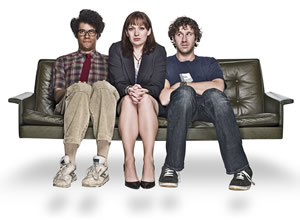
He is also keen to emphasise the upbeat nature of The IT Crowd. It's very cheerful, very optimistic, with people you're supposed to quite like. There's a real thing at the moment that comedy should be dark, and I just think that is the last thing we need at the moment, 'cos everything's so grim anyway. We're facing all sorts of extinction threats, so why have a comedy that looks at the gloomy side of things. Bit of the Blitz spirit. I call it 'singing in the underground'.
The affection with which Linehan imbues his characters is here once again, perhaps even more than normal. He admits that the two geeks, Roy and Moss, are based upon himself in years gone by. Roy is certainly me before I got married. And Moss is me maybe when I was about 16. But they're the same age, which is what makes them funny.

